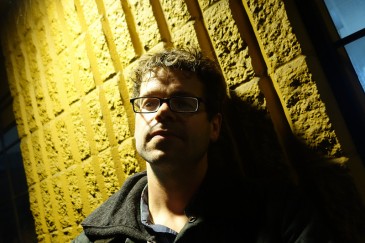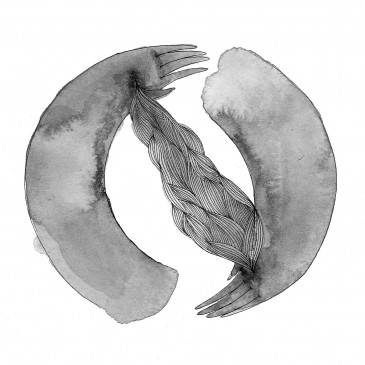
Something cuts through the near-complete static of Connect_icut’s (alias Samuel Macklin’s) sound. The music is lined with something, often a recurring set of glitchy noise, which pulls you away from total immersion.
It keeps the listener spinning away at the Rubik’s Cube of Connect_icut’s music. “I start off with this seething mass of noise, which is going to, at some point, almost cohere into something resembling a song,” says Macklin.
The lining can come in the form of a certain uncomfortableness, but Macklin, born in the west of England but now based in Vancouver, notes that there’s always “a solid point of reference” in his music.
The computer jamming twirl that sounds like a 1950s vision of the future, can be that point of reference. Or it can come as a more disturbing quality, as if the sound were haunted. Although the music can be challenging, unconventional, and even sometimes abrasive, it also contains a pop sensibility.
It’s in this tension between the abstract and the accessible where Macklin finds interest in science fiction work. “I think the thing I like about science fiction is that it’s a pulp form,” says the earnest and curly haired Macklin. “It’s a pop form; it’s kind of trashy. It’s considered less that way, but when most of the classic science fiction was written it was not a respectable form — it was pop trash.”
Macklin funnels abstract concepts through a simple (“like the Buzzcocks, just three cords”), but twisted, pop form. “I don’t see it coming from an avant-garde perspective. I see it as just, trying to do something really new and radical in the context of pop music.”
Macklin’s latest album, Crows & Kittiwakes Wheel & Come Again, was released in December. The album, produced completely on a computer, has an organic quality, too, pulled from Macklin’s experience in the backcountry of BC and Wales.
“It’s inspired by being in the middle of nowhere and just looking around and being like ‘This is beautiful’ but it’s also kind of scary,” says Macklin. As a sort of meditation on the sublime, the album is an account of the natural world in digital form; layers of sound bouncing off each other, with crackling textures and aerial hums.
The murkiness of ambient music plays a big part in Macklin’s conception of producing. The ability of electronic music to communicate “personal intensity” without forcing interpretation upon the listener, is invaluable to him. It’s a blur, rather than a ray of light. At the same time, he’s aware of the fact that most audiences are generally unresponsive to “laptop music” and that creating music digitally comes with prejudices.
Macklin crafts his music with the “graphical programming” of Max/MSP, a software which allows for code to be written using a visual interface. “It’s a really ethereal thing in that its all done behind the computer and its not physical,” Macklin explains intently, “but the way you can manipulate sounds with a computer the way you can play with sounds, its very tactile… I can literally have all these sounds moving around in this really chaotic way and I can grab them out of space and click them into place so they fall into line.”
“There’s this idea of what making music with a computer is like, which doesn’t jive with my idea of actually doing it and I’d love to interrogate these limitations we put on with digital audio,” says Macklin, who discusses music with a real honesty. “One of the thing that’s important to me is looking to polarities in music, like for me, its my bloody valentine. It’s like an ongoing, deep obsession with them. It’s noise and dissonance at just like this incredible volume but very immersive and beautiful and melodic as well.”
Fourier’s Algorithm, Connect_icut’s sixth album, is dedicated to French thinkers Joseph and Charles Fourier. The work of mathematician Joseph Fourier is central to Macklin’s music in that all digital audio and MP3 format goes through a Fourier transform, developed using Joseph’s theories.
Charles Fourier, who lived at roughly the same time as Joseph, was a philosopher and political thinker. Macklin starts to talk about Charles’ ideas on utopian socialism, but is reluctant. He insists he’s not an intellectual: “I can’t have any certainty about any conclusions I have about that. This kind of abstract, diffused music, it’s the only way I can explore those things.”
Connect_icut’s music occupies a weird space, but occupies that space in a really sincere manner. It’s space-age sound working through a lens of the uncanny. Not quite pop, and not quite organic either, there’s a definite indistinctiveness to the music. “I’m not going for an insular, head trip. It’s more a desire to make you more aware of or sensitized of your surroundings”

Connect_icut opened for Oneohtrix Point Never (OPN) in April at the W2 Media Café in Vancouver. Oneohtrix’s album Replica, sampled extensively from old television commercials. “It wasn’t just dealing with straight nostalgia or straight irony. He was kind of interrogating those things,” Macklin says about the album. “Doing stuff with trash material or material that’s considered trash and doing it with intellectual pretensions. It’s something that’s appealing to me. Partly because a lot of people are going to look at you and say ‘You’re a pretentious idiot, this is just trash.’ It’s almost worth doing that just because it requires that leap of faith.”
Macklin’s new album, tentatively named Small Town by the Sea, is still in production. The album features field recordings, as well as some percussion and vocal work. The record ends “with little waves recorded on the shore of Jericho beach,” Macklin admits gleefully. It’s new terrain, however, and he expresses some uncertainty over the way that field recordings can be too obvious, and too descriptive. “Even though [sampling field recordings] are still very abstract, it feels like I’m giving a lot away”. The album is set to be released by Aagoo on April 15.

